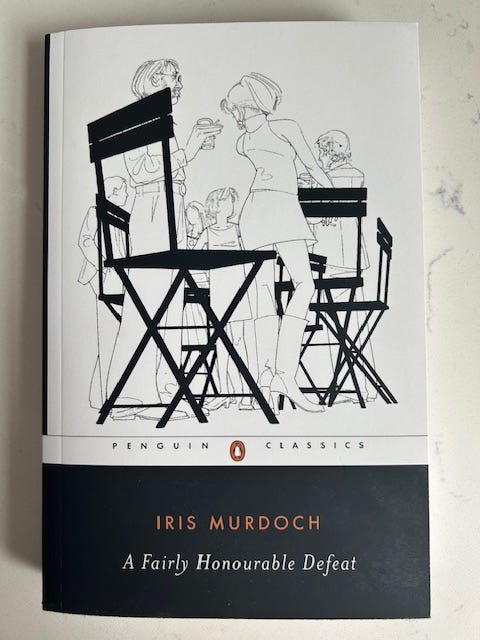'A Fairly Honourable Defeat' by Iris Murdoch
Books on GIF turns 9; 'She poured out a little whisky and sipped it. She felt an instant of false comfort. The whisky did not know of her troubles.'—Review #256
Books on GIF’s ninth anniversary was this week. Where does the time go? I say this every year because I can’t believe Donna and I have been publishing this newsletter for so long. (As I’m writing, I hear in my head that Kate Bush song where she sings, ‘Wow, wow, wow, wow, wow, wow, UNBELIEVABLE!’) What a fun adventure this has been. I’ve read some amazing books, as you’ve seen. There have been great moments. And I’ve gotten to know many of you—either in the comments or in real life. It’s truly a blessing that such an engaged and positive reading community has formed here. It means so much that you’ve supported Books on GIF over the years. From the bottom of my heart:

As we kick off year 10, would you have a moment to provide some feedback about Books on GIF? Are we reviewing interesting books? Are you enjoying our discussions and reader’s choice polls? Are there things we could be doing better? Let us know!
I’ve said many times that Iris Murdoch is my favorite novelist, and I featured one of her books on our eighth anniversary. I figured I’d maintain that tradition this year with ‘A Fairly Honourable Defeat.’ I didn’t know anything about this book when I picked it up (how many times have I said that over the years?), but I had a $5 bookstore coupon in my pocket, so I said:

Here’s the book’s cover:

Julius and Morgan have recently returned to London—separately—after having a years-long fling in the U.S. Julius, who does some kind of work related to anthrax, wants to move on from the affair, while Morgan, a philologist, is a mess. She won’t go back to her husband, Tallis, because he’s weak and boring, and has been living in squalor since Morgan ran off with Julius. She can’t get her own place because she’s broke. Her only option is to crash at the home of her well-to-do sister and brother-in-law, Hilda and Rupert Foster. Hilda and Rupert project the perfect middle-class life. They live in an upscale area of London in a beautiful home that has a well-kept garden and a backyard swimming pool, and they have an unblemished marriage. Hilda gives parties and participates in local groups; Rupert is writing a philosophy book. Morgan hopes their apparent perfection will stabilize her as she tries to get back on her feet. But she is tormented by a secret shame, and hounded by one muddle after another. For example, after trying to get her college-dropout nephew, Peter, to return to Cambridge, she learns he has creepy and awkward feelings for her. In another, she tries to get back together with Julius, with bizarre and uncomfortable consequences. I wanted to tell Morgan to:

Meanwhile, even though Julius is adamant about not wanting to rekindle the affair with Morgan, he remains in her social orbit. He’s friends with Rupert, and also with Axel—who’s the de facto husband of Rupert’s brother, Simon. Julius is a cynic and a mischief maker. One time, after a dinner with Simon and Axel, Julius pulls Simon aside and whispers for him to come over on a Friday night, and not to tell Axel. And later, he tells Morgan that the bonds of friendship, family and love are thin and easily broken. Morgan challenges him, and Julius bets that he can easily break up one of the couples in their circle. Morgan takes the bet, and Julius proceeds to secretly meddle in the lives of Hilda and Rupert, Peter, Tallis, and Simon and Axel. I won’t spoil it, but his manipulative scheme had me on the edge of my seat, and its outcome had me like:

I love Iris Murdoch’s novels because they feature characters who are in dilemmas and jams of their own making—they are often undone by their self-absorption or by a misguided adherence to society’s mores and norms. Her books also are deeply philosophical, and probe a condition of our being. ‘A Fairly Honourable Defeat,’ for example, explores various ways deception and betrayal surface in day-to-day life. Morgan and Julius’s affair kicks off the narrative. In response, Morgan’s jilted husband, Tallis, deceives himself that she will come back to him; the piled-up dishes and stinking milk bottles he leaves lying around, as well as the things of hers that he’s left untouched to gather dust and moth-eaten holes, are manifestations of his self-deception, denial and depression. Hilda and Rupert project perfection, but can their marriage survive the slightest challenge? Axel is jealous of Simon, constantly worried that the younger man is cheating on him. And Julius, who believes he is a practitioner of radical honesty and the only person in his milieu who sees things clearly, is blinded by arrogance. As he executes his plan, he is unwittingly aided by other characters who withhold information or who participate in his lies in order to protect themselves, or because they believe they are protecting someone’s feelings. The story forces the reader to reckon with their own similar behavior. How often have we told a lie because we didn’t want to hurt someone? Has that ever worked? Is Julius right—are all of our relationships hanging by a thread? When I reached the end of the book, I was like:
‘A Fairly Honourable Defeat’ is a fascinating book, and I’m glad I read it to celebrate BoG’s ninth anniversary. If you’re looking for an entry point into Iris Murdoch’s work, it’s a great choice. I highly recommend it.
An opening excerpt:
‘Julius King.’
‘You speak his name as if you were meditating upon it.’
‘I am meditating upon it.’
‘He’s not a saint.’
‘He’s not a saint. And yet—’
‘What about him?’
‘He’s in England.’
‘I know.’
‘Who told you?’
‘Axel.’
‘I didn’t know Julius knew Axel.’
‘That is characteristic of both Julius and Axel.’
Hilda and Rupert Foster, celebrating their twentieth wedding anniversary with a bottle of rather dry champagne, were sitting in the evening sun in the garden of their house in Priory Grove, London, S.W.10. Hilda, a plumper angel now, reclined limply, exhibiting shiny burnished knees below a short shift dress of orangy yellow. Her feet were bare. Her undulating dark hair showed some needle-thin lines of grey. Her burly boyish-faced husband, whom she had at last persuaded to stop wearing shorts, sat open-shirted, cooking in the sun. He was red, hoping later to be brown. His shock of abundant fair hair had faded with the years, becoming unglistening and dry while still undeniably blond. They were a handsome pair. They were altruistic, but treated themselves judiciously to luxuries. The latest one, to which they had not yet become accustomed, was a diminutive swimming pool which made a square of flashing shimmering blue in the middle of the courtyarded garden. The garden was enclosed by an old redbrick wall which was surmounted by a trellis bearing an enlacement of Albertine and Little White Pet, all now in outrageous flower. The air was dense with smells of roses and of the chamomile which Hilda was attempting to grow between the paving stones.
My rating:

‘A Fairly Honourable Defeat’ by Iris Murdoch was originally published by Chatto & Windus in 1970. This edition, with an introduction by Peter J. Reed, was published in 2001. 412 pages. $22 at Bookshop.org.
What’s next:
Next week, we’ll feature a roundup of nonfiction. In two weeks, we’re kicking off another short-book summer with three more books you can finish in a day or two. Here’s a peek at their covers:
Books on GIF does not solicit or accept review copies. We feature books we purchase at independent bookstores around New York City and on our travels, or were borrowed electronically from the Brooklyn Public Library.
Before you go:
ICYMI: Review #255
Read this: As you may have seen, ‘James’ by Percival Everett won the Pulitzer Prize for fiction. This seemed the most likely outcome, as the novel had already collected several major awards. But The New York Times has an interesting piece about the unusual step the Pulitzer committee took to reach its decision.
Read this, too: I had completely forgotten that a new film adaptation of ‘Bonjour Tristesse’ by Françoise Sagan was in the works until I saw
’s recent installment of her terrific newsletter Moviepudding called ‘I love how Chloe Sevigny butters toast. It describes the film, which I want to see, and also includes a Q&A with its director, Durga Chew-Bose.Thanks for the shoutout: I always get a thrill whenever another newsletter writer links to BoG. Recently, it happened twice! Abra at The Booktender shouted out our review of ‘On the Calculation of Volume’ by Solvej Balle, and Nicole at Literaria quoted our review of ‘Jane Eyre’ by Charlotte Brontë. Thank you so much, friends!
If you enjoyed this review:
Thanks for reading, and thanks especially to Donna for editing this newsletter!
Until next time,
MPV











Happy nine years to the man that almost single handedly created the greatest book stack friend group of all time. Thanks for welcoming all the newbies and just for being you !
I love Murdoch and I loved this book when I read it last year. But, as always with Murdoch, there is an underpinning philosophical framework that I'm only slightly tuning into. So I found this review https://archive.nytimes.com/www.nytimes.com/books/98/12/20/specials/murdoch-defeat.html from 1970 really helpful. I was quite intrigued by the charismatic 'evil' Julius and the shambolic 'good' Tallis. So interesting that Tallis, who in his life is otherwise 'weak', is the only one who knows how to respond decisively to a racist jerk in a restaurant. His otherwise dithering personality hides his moral clarity.
I also enjoyed Leonard Browne's long, hilarious diatribe about sex (which opens chapter 5) which culminates in Hilda saying, 'Is Tallis at home?' So funny.